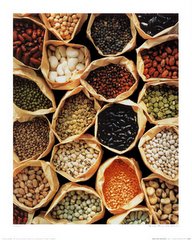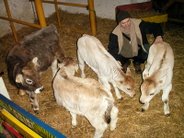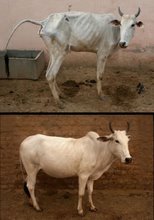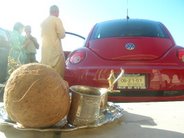Wednesday, August 22, 2007
Organic Farming Could Feed the World
Article from Organic Consumers Association
Along with reporting on fertilizers, biotech, ethanol, corporate consolidation and the agrofuels vs food debate comes an increased science reporting of the real world of organic-ecological-diversified agriculture that actually feeds the world.
The biotech industry used to regard speed as one of the defining characteristics of genetic engineering. To prove the point, it rushed new products to market with little regard for the consequences. Speed, however, is a characteristic of neither good science nor sustain-able agriculture. Now the 'slow' reports of scientific findings on nutritious food and sustainable agriculture are beginning to surface. It will be interesting to see how the biotech bullies deal with these. The authors of a new study* claim that a switch to organic farming would not reduce the world's food supply but could actually increase food security in developing countries. They claim their findings lay to rest the debate over whether organic farming could sustainably feed the world. The team of researchers has compiled research from 293 different comparisons into a single study to assess the overall efficiency of the two agricultural systems.
They found that in 'developed' countries organic systems produce, on average, 92% of the yield produced by conventional agriculture. In 'developing' countries, however, organic systems produce 80% more than conventional farms. Then, using data from the UN Food and Agriculture Organization, the team estimated what would happen if farms world-wide were to switch to organic methods today.
The researchers found that under an organic-only regime, farms could produce between 2641 and 4381 calories per person per day compared to the current world equivalent of 2786 calories per person per day. Members of the team believe the calculations they carried out to arrive at the upper number are the most realistic. These took into account the higher yields that would be obtained in developing countries, and the details of which crops are grown where. Nutritionists recommend that people consume between 2100 and 2500 calories a day.
The researchers found that small farms tend to produce more per hectare of land. They also note that although organic production tends to require more labour, this labour is often spread out more evenly over the growing season, making it easier to manage. They also point out that once you incorporate the environmental costs, then organic agriculture is a much superior system.
In this era of climate change and unpredicted disasters (droughts, floods, heat waves, etc.) organic/ecological agriculture has another important virtue. Relying on locally-sourced and adapted species and varieties as well as labour, knowledge, and skills, it is much more resilient than a system which is dependent on manufactured and imported inputs.The issue of speed is also crucial. As George Monbiot has persuasively argued, air travel may be the single most intractable cause of carbon emissions. But fast boats, trains, and cars are also problematic. The fact is that when you take the whole system into account, speed is simply not efficient. Slower modes of transport would, of course, limit the perishable food and other products which are now shipped around the globe, and make us all more dependent on what we can produce ourselves. Not a bad idea.
* Organic agriculture and the global food supply: Catherine Badgley, Jeremy Moghtader, Eileen Quintero, Emily Zakem, M. Jahi Chappell, Katia Avilés-Vázquez, Andrea Samulon and Ivette Perfecto, Renewable Agriculture and Food Systems, 2007, Cambridge University Press
Along with reporting on fertilizers, biotech, ethanol, corporate consolidation and the agrofuels vs food debate comes an increased science reporting of the real world of organic-ecological-diversified agriculture that actually feeds the world.
The biotech industry used to regard speed as one of the defining characteristics of genetic engineering. To prove the point, it rushed new products to market with little regard for the consequences. Speed, however, is a characteristic of neither good science nor sustain-able agriculture. Now the 'slow' reports of scientific findings on nutritious food and sustainable agriculture are beginning to surface. It will be interesting to see how the biotech bullies deal with these. The authors of a new study* claim that a switch to organic farming would not reduce the world's food supply but could actually increase food security in developing countries. They claim their findings lay to rest the debate over whether organic farming could sustainably feed the world. The team of researchers has compiled research from 293 different comparisons into a single study to assess the overall efficiency of the two agricultural systems.
They found that in 'developed' countries organic systems produce, on average, 92% of the yield produced by conventional agriculture. In 'developing' countries, however, organic systems produce 80% more than conventional farms. Then, using data from the UN Food and Agriculture Organization, the team estimated what would happen if farms world-wide were to switch to organic methods today.
The researchers found that under an organic-only regime, farms could produce between 2641 and 4381 calories per person per day compared to the current world equivalent of 2786 calories per person per day. Members of the team believe the calculations they carried out to arrive at the upper number are the most realistic. These took into account the higher yields that would be obtained in developing countries, and the details of which crops are grown where. Nutritionists recommend that people consume between 2100 and 2500 calories a day.
The researchers found that small farms tend to produce more per hectare of land. They also note that although organic production tends to require more labour, this labour is often spread out more evenly over the growing season, making it easier to manage. They also point out that once you incorporate the environmental costs, then organic agriculture is a much superior system.
In this era of climate change and unpredicted disasters (droughts, floods, heat waves, etc.) organic/ecological agriculture has another important virtue. Relying on locally-sourced and adapted species and varieties as well as labour, knowledge, and skills, it is much more resilient than a system which is dependent on manufactured and imported inputs.The issue of speed is also crucial. As George Monbiot has persuasively argued, air travel may be the single most intractable cause of carbon emissions. But fast boats, trains, and cars are also problematic. The fact is that when you take the whole system into account, speed is simply not efficient. Slower modes of transport would, of course, limit the perishable food and other products which are now shipped around the globe, and make us all more dependent on what we can produce ourselves. Not a bad idea.
* Organic agriculture and the global food supply: Catherine Badgley, Jeremy Moghtader, Eileen Quintero, Emily Zakem, M. Jahi Chappell, Katia Avilés-Vázquez, Andrea Samulon and Ivette Perfecto, Renewable Agriculture and Food Systems, 2007, Cambridge University Press
Subscribe to:
Post Comments (Atom)



















No comments:
Post a Comment